Black Bush Polder (BBP), a farming community with a population of about 5,000 has been experiencing serious social problems and deteriorating roadways but the government maintains that with its interventions, life seems more promising.
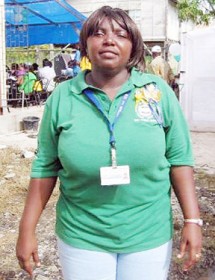
The polder is made up of four main areas: Lesbeholden, Johanna, Mibicuri and Yakusari. It stretches to a distance of 22 miles and is located about seven miles away from the public road.
There are entrances at Adventure on the Corentyne which lead to Lesbeholden and at Number 43 Village, which takes you to Yakusari.
Although the areas are dominated by Indo-Guyanese, a small village, Zambia, nestled between Johanna and Mibicuri is made up of predominantly Afro-Guyanese.
Driving through BBP recently, first to Yakusari and then to the connecting areas felt like a never-ending trip, having to slow ever so often to manoeuvre around the huge potholes.
The road also seemed to be a major concern for residents who
commented: “this road terrible; when the rain fall it does get muddy and if people don’t know the area they can easily slip into the canal.”
They said relatives have also refused to visit them until the road is fixed and that “this road damaging up we vehicles; some people even frighten fuh buy new cars.”
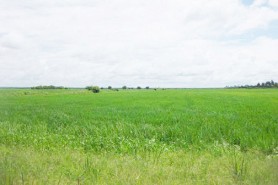
One man said that he had to pay about $30,000 to replace the damaged CV-joint on his car. His tyres are also being destroyed and he has to pay almost $4,000 to replace one each time.
The residents said too that “life in Black Bush was sweet, but not now. They [government officials] keep promising to fix the main access road and up to now dem can’t do it.”
Earlier this year President Bharrat Jagdeo had announced that US$7 million would be spent on rehabilitating the BBP road and residents can hardly wait for that to happen.
Major problem
In an interview with Stabroek News, Regional Chairman of Region Six, Zulfikar Mustapha acknowledged that the access road is a major problem for residents and said soon their problems would be over.
He said the contract was awarded to BK International and that the company is doing the final survey and the work was expected to commence shortly.
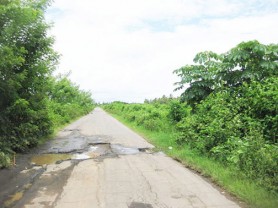
Apart from the main road, residents said many of the streets were also in deplorable conditions and that contractors who were hired to fix them did substandard work.
They said that a few months ago “a contractor was paid to fix a street with crusher run but he just grade it and put sand. Then when the rain fall the sand wash out…”
The residents are also unable to access the potholed street with their vehicles and are inconvenienced when they have to park out on the main road.
“That is not right; we need we vehicles to go home and park in we yard because people can vandalize them…”
Mustapha agreed that the contractors had done shoddy work on some of the streets. He said the region has “condemned those roads and the contractors were not paid. They have to do remedial work before they are paid.”
The region has rehabilitated 12 community roads so far for the year.
There is also a system where the community gets involved during the signing of the contracts so as to ensure that the work is done according to specifications.
Residents were also concerned about the bush on both sides of the Yakusari access road, saying it is dangerous and they want it to be cleared.
Farming
Most of the residents in the area are involved in either large or small-scale rice farming while others are engaged in cash crop farming and livestock rearing.
Rice is the main crop produced in the area and Mustapha said that at present out of the 18,000 acres of rice land available in BBP about 17,000 acres is under cultivation “because of the work done by the region over the years.”
He pointed out that the polder is currently in the middle of a “massive rehab process where the Ministry of Agriculture is rehabilitating all of the drainage structures and canals at Yakusari and Johanna.
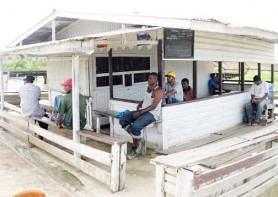
Then the process would continue to the other two polders.”
When this newspaper visited the area last month, farmers said their gardens were inundated due to heavy rainfall and that they had lost their crops.
They were waiting for the rainy weather to be over to start planting again.
Mustapha said government has also provided BBP with a “permanent excavator to work round the clock to maintain the drainage trenches” to assist the cash crop farmers.
According to him there has been better production in terms of cash crop and rice and that BBP “is returning to its former glory to be the bread basket of Guyana.”
He enthused that “agriculture is definitely expanding; almost all of the available land is taken up and 85% of the land available for cash crop farming has been occupied.”
He noted that the area was experiencing a lot of flooding but said residents now have more confidence in the drainage and infrastructure systems.
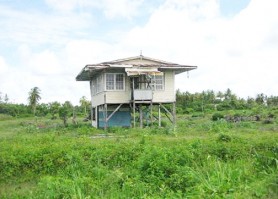
The chairman continues his meetings in BBP on Wednesdays where “on-the-spot decisions are made. We also have rangers in all the polders manning the systems on a daily basis.”
During his weekly trips to BBP he is accompanied by a team that deals with the issues raised by the residents. The team comprises representatives from the Guyana Power & Light, the Guyana Water Incorporated (GWI), the education, health and human services departments and the police.
Millers owing farmers
While the farmers were happy that they were producing better rice, they were worried about the future of this venture because the millers were not paying for their paddy.
Most of the farmers take their paddy to the Mahaicony Rice Mill located at Johanna and while the price is attractive, they were not being paid or would sometimes receive “bounce cheques.”
One farmer who is owed millions of dollars said he was forced to take seed-paddy, fertilizer and items on credit.
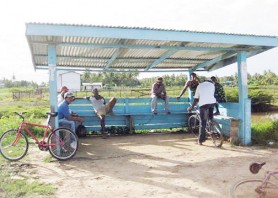
He had also taken a loan from the bank to reinvest in his crop and to purchase a tractor. The farmer was distressed about how he would be able to repay his debt and maintain his children and was afraid too that his tractor would be seized.
The chairman noted the concerns of the farmers who have not been paid by the millers and said the Guyana Rice Development Board and the Rice Producers’ Association are addressing the problem. He hoped that the farmers would not have to wait much longer for their money.
Further, residents pointed out that they have to incur additional expenses to purchase drugs to get rid of paddy bugs that have been affecting their crops.
According to them, the “genuine” drugs that they purchase do not work and “we have to buy the cheap drugs from Suriname because it is a better quality and it does work better.”
The farmers are aware though, of the consequences involved in using the illegal drugs and called on the government to ensure that the right type is imported.
Meanwhile this newspaper was told that many residents had migrated either through the “backtrack” system – to escape the economic situations – or through sponsorship by relatives.
Many of the houses were left abandoned while some were sold or left in the care of persons.
Mustapha pointed out that because of the great scope now in terms of agriculture in BBP some people were returning and were “taking up old land…”
However, due to a lack of job opportunities, many youths who had performed well academically and do not want to venture into farming have still been relocating.
The Mibicuri Community Developers (MCD), a non-governmental organization which was established 10 years ago has “implemented innovative agricultural practices” in cash crop farming to attract the youths, though.
Head of the MCD, Jacqueline Cummings-Johnson told Stabroek News that they have been spearheading a number of different agricultural and social projects aimed at maximizing financial returns.
She reiterated that apart from farming the community has no form of employment for youths who lacked the motivation to farm.
On that note, she said that 100 youths would be empowered through agricultural training including, organic farming, crop rotation, planting in confined spaces, accessing good marketing strategies and executing correct methods of farming.
Alcohol
Johnson told this newspaper too that many youths have been involved in negative activities such as alcohol consumption.
This, she said accounted for the large number of suicides, domestic issues and many other social problems in the community.
The BBP area was known for having a high incidence of suicide with persons choosing to end their lives for various reasons such as financial and domestic problems and for not getting to marry the persons of their choice.
They would mostly consume poison as a way out of their problems because it would always be at hand for agricultural purposes while a few would hang themselves.
Miriam Jainarine of the MCD had told this newspaper recently that the rate of suicide was very high in BBP because persons did not know who to turn to in terms of problems.
She said they felt desperate and alone and believed that no one would be able to understand or help them with their problems.
But that was before they sought the services of the MCD which also deals with social problems. The non-governmental organisation is also helping with community development and empowerment.
According to Jainarine, they would first conduct “house to house visits to inform persons about our services.” She said they provide counselling and if they “cannot handle the case we would refer them to our collaborating partner; the Saint Francis Community Developers or to other agencies.”
Some farmers told this newspaper that they take loans from the banks to invest in their crops and admitted that when they are unable to honour their debts they become frustrated and turn to alcohol.
Stabroek News caught up with a few farmers who were ‘liming’ at a snackette at the corner of Yakusari and they gladly highlighted some of the problems in the area.
The snackette which was known to enjoy a thriving business in the past barely had a few items scattered on the shelves. The owner had gone out for a while and no one was tending to the business at the time.
But as was customary, residents would gather there for a “gaff” because they had “nothing else to do.”
They pointed out that there are “a lot of rum shops” at Yakusari and no “food shop.” The only Chinese restaurant is located at Lesbeholden and that also sells alcohol.
The farmers quite frankly admitted that they consume a lot of alcohol as a solution to their financial problems.
“When we don’t get the money to go back to the land we don’t gat nothing else to do but drink rum. Is better we drink rum than hang weself or drink poison,” they said.
Asked whether they attend their places of worship and turn to God with their problems, they responded, “We does go to mandirs yes and although we does pray that don’t help with de problems; we have to drink.”
They pointed out that they pass the rum shops to get to the mandirs and on their way home they would stop in for a drink.
With regard to where they get the money from for the alcohol, they said they would purchase it on credit.
One man even jokingly admitted that he was hiding from a rum shop owner because he did not have the money to pay his debt.
They said too that the issue of money had resulted in domestic problems with their wives who also have to take groceries from the shops on credit.
According to a shop owner, some customers owe her over $300,000 but she could not pressure them to pay because she knows that they were waiting on their payment from the millers.
Over at Lesbeholden, another group of men were ‘liming’ at a bus-shed but they told this newspaper that although they would consume alcohol it is just for “enjoyment” and not because of problems.
Meanwhile, Mustapha said there has been development in terms of education and that all of the schools in BBP have been rehabilitated and benefited from additional teachers.
He said the Black Bush Polder Secondary at Mibicuri has performed well at the recent Caribbean Secondary Education Certificate examination with 11 persons gaining over five subjects.
Repairs are also being done to the Mibicuri Hospital which has also been equipped with ambulance for the past three years. The hospital now has a permanent doctor while health workers conduct regular visits to the polders.
Also located at Mibicuri is a police station, an abandoned magistrate’s court building, a post office and the office of the Black Bush Polder Neighbourhood Democratic Council.




